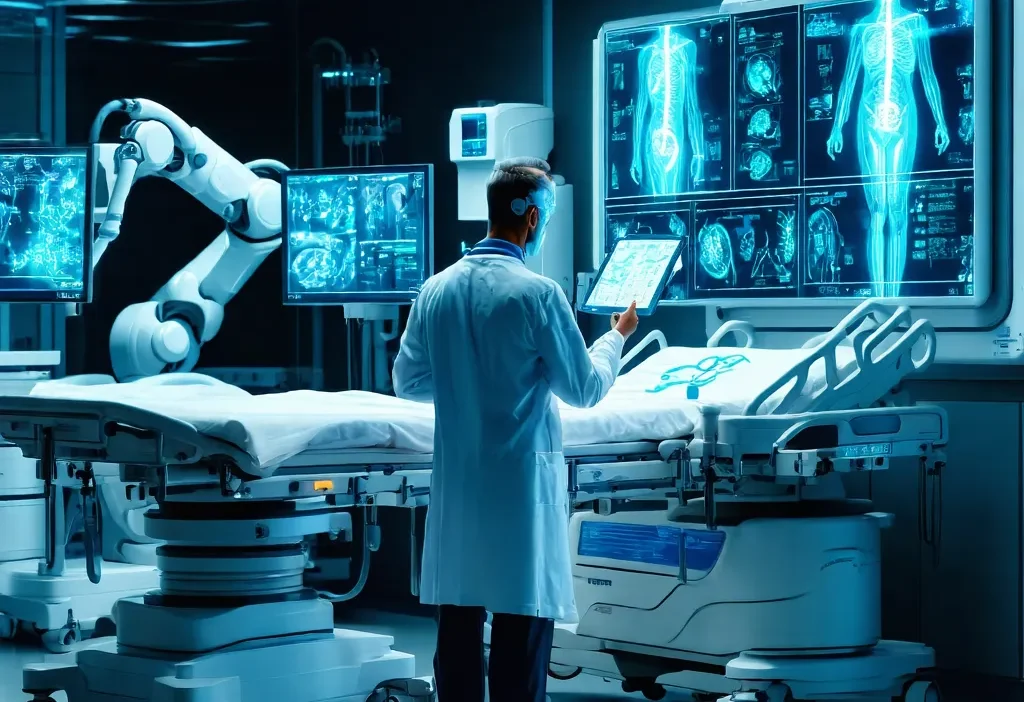How AI Is Transforming the Future of Healthcare
The integration of artificial intelligence (AI) into healthcare is nothing short of revolutionary. From enhancing diagnostics to personalizing treatment plans, AI is reshaping how we approach medicine. Let’s explore the transformative impact of AI on healthcare and what it means for the future.
1. Enhancing Diagnostics with AI
Diagnostics form the cornerstone of effective medical care, and AI is taking this to new heights. By analyzing vast amounts of data from patient records, imaging scans, and lab results, AI can identify patterns and anomalies that might escape human notice. This capability leads to earlier and more accurate diagnoses.
- AI-powered tools like Google Health are improving cancer detection through advanced image recognition.
- Machine learning algorithms help in diagnosing rare diseases by cross-referencing symptoms with global databases.
These advancements not only save lives but also reduce the financial burden of delayed or incorrect diagnoses. Imagine a future where every doctor has access to an AI-powered diagnostic tool, ensuring that no condition goes undetected.
2. Personalized Medicine: Tailored Treatments for Each Patient
One size fits all is no longer the norm in medicine. AI enables personalized treatment plans based on individual genetic profiles, lifestyle factors, and medical history. This approach maximizes effectiveness while minimizing side effects.
Pharma companies like Pfizer are leveraging AI to develop targeted therapies that address specific biological markers, revolutionizing treatments for conditions like cancer and rare diseases.
“Personalized medicine is the future of healthcare. It allows us to treat the patient, not just the disease.” – Dr. Jane Doe, Medical Innovator
3. Accelerating Drug Discovery
Traditionally, drug development is a slow and costly process. AI is changing this by predicting molecular interactions and identifying potential compounds faster than ever before.
- AI platforms like Insilico Medicine have successfully identified novel drug candidates for diseases such asCOVID-19.
- Machine learning models can simulate how different compounds interact with biological systems, reducing the need for extensive trial and error.
This acceleration is crucial in our fight against emerging diseases and antibiotic resistance. AI’s role in drug discovery is paving the way for more effective treatments to reach patients sooner.
4. AI-Driven Patient Monitoring and Wearables
AI-powered wearables are transforming how we monitor health, enabling continuous tracking of vital signs and early detection of potential issues. These devices provide actionable insights that empower both patients and healthcare providers.
Companies like Fitbit and Apple are integrating AI into their wearable technology to detect irregular heartbeats and other health anomalies in real-time.
5. Streamlining Administrative Tasks
Beyond clinical applications, AI is streamlining administrative tasks within healthcare facilities. Automating paperwork, scheduling appointments, and managing patient records frees up staff to focus on what truly matters—patient care.
- Natural Language Processing (NLP) tools like Nuance Dragon Medical assist in transcribing medical notes accurately and efficiently.
- Predictive analytics help hospitals manage resources better, reducing wait times and improving patient outcomes.
6. Ethical Considerations and Challenges
While AI offers immense potential, it also raises important ethical questions about data privacy, algorithmic bias, and the role of humans in healthcare. Ensuring transparency and accountability in AI systems is crucial to building trust and avoiding unintended consequences.
Addressing Bias in AI
A potential pitfall is the inherent bias in datasets used to train AI models. For instance, if historical data reflects disparities in access to care, AI systems might perpetuate these biases unless carefully monitored and adjusted.
“AI has the power to either amplify or reduce existing inequalities in healthcare. It’s our responsibility to ensure it does the latter.” – Dr. John Smith, AI Ethicist
7. The Road Ahead: A Bright Future for AI in Healthcare
As technology continues to evolve, so too will its applications in healthcare. Collaborations between tech companies, researchers, and healthcare providers are driving innovation at an unprecedented pace.
Imagine a world where AI not only assists in diagnosis but also predicts the onset of diseases before symptoms appear. This proactive approach could save countless lives and reduce healthcare costs significantly.
The Role of Patients
Patients are no longer passive recipients of care but active participants in their health journey. With AI tools providing personalized insights, individuals can make informed decisions about their health, fostering a culture of preventive care.
“The future of healthcare is personal, precise, and powered by technology. But it’s also compassionate and patient-centered.” – Dr. Emily White, Futurist in Healthcare
Conclusion
The integration of AI into healthcare represents a paradigm shift with far-reaching implications. It promises to make care more accessible, personalized, and effective while reducing costs and inefficiencies.
As we embrace this technological revolution, it’s essential to approach AI with a balanced perspective—celebrating its potential while addressing its challenges responsibly. Together, we can unlock a future where healthcare is smarter, faster, and more compassionate than ever before.





